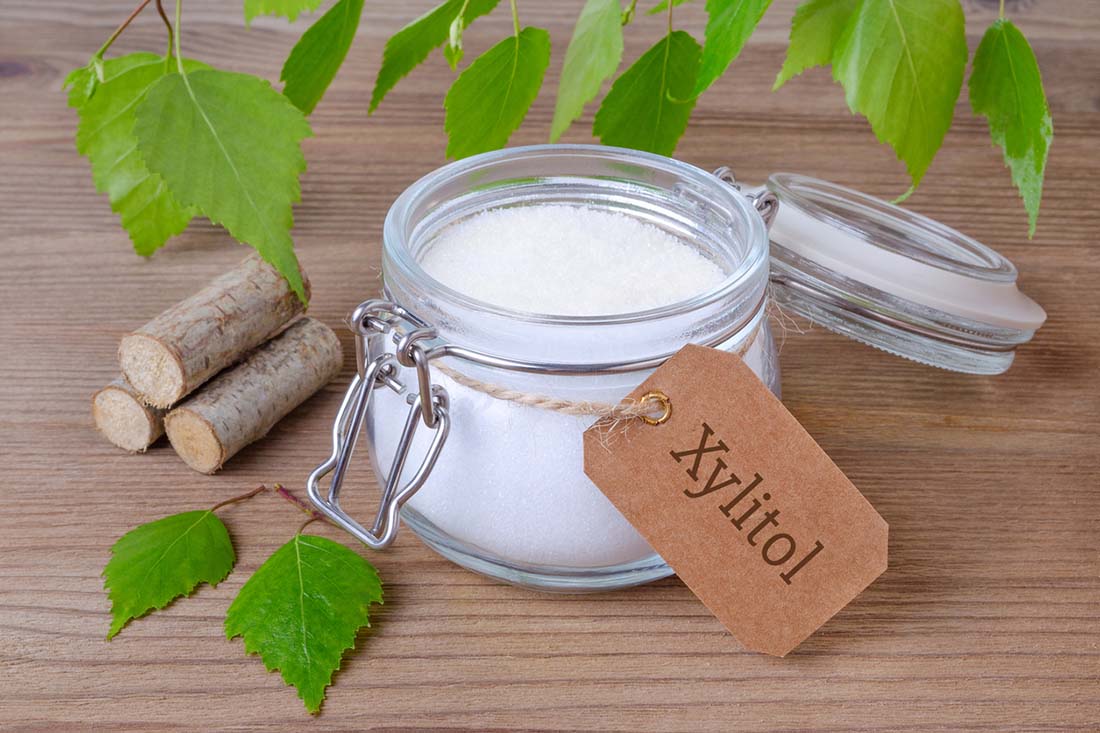There are tons of different ingredients in the foods we consume and the products we use. From preservatives to sweeteners and other additives, sometimes it’s tough to know what’s what! Awareness of what’s in your food is important for a number of reasons, but one of them is knowing whether foods are safe for dogs.
Here’s what dog owners need to know about birch sugar and how it can affect dogs’ health.
What Is Birch Sugar?
Birch sugar is xylitol, an artificial sweetener used as a sugar substitute. It’s used in place of natural sugar because it has fewer calories and can be a good sugar alternative for people who have diabetes. While the U.S. Food and Drug Administration (FDA) deems birch sugar safe for humans, it is highly toxic to dogs.
Common Uses Of Birch Sugar
There’s a variety of human foods and consumer products that can potentially contain birch sugar. It may surprise you to learn that some of the following items contain birch sugar. However, knowing which products typically contain it will help you create a mental list of things to avoid letting dogs get into.
- Candy
- Chewing Gum
- Toothpaste
- Mouthwash
- Breath mints
- Sugar-free ice creams
- Sugar-free baked goods
- Gummy vitamins
- Chewable vitamins
- Dietary supplements
- Medications
- Peanut butter
- Baking mixes
- Flavored water
- Jams and jellies
- Protein bars
What Is Birch Sugar Made Of?
One extracts birch sugar from birch bark, specifically the bark of Finnish birch trees. The birch sap or “wood sugar” contained in the bark is drawn out through a process called hydrolysis (breaking down compounds using water) and then crystallizes to form birch sugar.
Birch sugar and xylitol are the same thing, the two are simply names for one another. Whether you see the ingredients listed as birch sugar or xylitol, products that have either term on the label aren’t safe for dogs and shouldn’t be shared with them.
Birch Sugar Is Toxic to Dogs
Birch sugar is highly toxic to dogs. Ingestion of the stuff by dogs may require hospitalization and can be life-threatening if not treated quickly and properly.
The main issue that birch sugar causes in dogs is changes in blood glucose due to hypoglycemia. This is when blood sugar levels drop rapidly and the body isn’t able to keep up with the release of insulin needed to counteract the low blood sugar.
Hypoglycemia in dogs can lead to seizures, loss of consciousness, and even liver failure. Always check the ingredients of human food before sharing it with your furry friend. Additionally, store foods meant for humans out of your dog’s reach.
Other Sweeteners That Are Toxic To Dogs
Unfortunately, xylitol aka birch sugar isn’t the only sweetener that isn’t safe for dogs. There are several other sweeteners found in foods, candies, and other products that dogs should probably avoid.
Erythritol is a non-calorie carbohydrate sweetener that can cause gastrointestinal issues in dogs if ingested in large quantities.
Aspartame is an artificial sweetener found in many diet sodas and dairy products. It’s known only to cause minor gastrointestinal issues in dogs but is still not a safe product for them to eat.
Sucralose is a zero-calorie artificial sweetener that is sometimes considered safe for dogs, but in large quantities can cause upset stomachs, diarrhea, or vomiting.
Symptoms of Xylitol Poisoning in Dogs

Pet owners should be aware of the signs of xylitol poisoning from products like birch sugar. Dogs who accidentally ingest food containing xylitol will typically start to show signs of food poisoning within about 30 minutes. It’s also possible for symptoms to come on much faster, and in some cases can take up to 12 hours to present themselves.
Symptoms your dog might experience after ingesting xylitol include:
- lethargy
- vomiting
- diarrhea
- weakness
- poor coordination
- collapsing
- tremors
- seizures
If you observe any of these in your dog whether you witnessed them eat something they shouldn’t or not, contact emergency services.
What Should I Do If My Dog Eats Birch Sugar?
As mentioned, birch sugar is toxic to dogs and can be extremely harmful to their health if ingested. If you think your dog has eaten birch sugar or any other food item that contains xylitol, contact the pet poison helpline or the ASPCA Poison Control Center immediately.
Don’t attempt any treatment before consulting poison control or your veterinarian, but be sure to contact help immediately. Monitor your dog closely and follow the directions given by experts.
Pet Poison Helpline: (800) 213-6680
ASPCA Animal Poison Control Center: (888) 426-4435
Treatments for Xylitol Poisoning in Dogs
Treatments for xylitol poisoning may be different depending on how much or how recently your dog ingested the stuff. They might include induced vomiting prescribed by your vet, medications to prevent liver damage, or hospitalization to get IV fluids.
Avoid Accidentally Feeding Your Dog Birch Sugar
Accidents happen, but you certainly want to avoid your dog’s chance of accidentally eating birch sugar. Here are a few precautions you can take to avoid the unwanted ingestion of foods that aren’t meant for dogs.
Be Careful Which Human Foods You Share
Be careful which foods you choose to share with your dog. Knowing which human foods are safe for dogs and being aware of which foods aren’t will be hugely helpful to you in deciding what to share and what not to. Doing your research here is key.
Always Check The Labels
Checking the labels and taking inventory of all the ingredients in food before sharing it with your dog is an important precaution. Reading the ingredients, especially of new foods you haven’t shared before, is the best way to be sure you’re not accidentally sharing xylitol-containing foods with your pup.
Store Human Food in a Safe Place
Store human food in a safe place to keep your dog from chowing down without you knowing, or on foods that aren’t pet-approved. One of the number one ways dogs can get xylitol poisoning is by eating chewing gum they found in their owner’s purse or pockets.
Keep your sweets and snacks in the pantry or cabinets, and store toiletries and dental products safely in the bathroom.
